#22: Always Begin With the End in Mind
If You Don't Know Where You're Going, You'll Never Get There
Alice and the Cat
Alice: Would you tell me, please, which way I ought to go from here?
The Cheshire Cat: That depends a good deal on where you want to get to.
Alice: I don't much care where.
The Cheshire Cat: Then it doesn't much matter which way you go.
Alice: ... So long as I get somewhere.
The Cheshire Cat: Oh, you're sure to do that, if only you walk long enough.
Alice’s Adventures in Wonderland has always provided great wisdom and advice and done so with wit, humor, and wordplay. If any advice is timeless, it’s knowing you’ll never get anywhere if you don’t know where you’re going. And you can’t chart a course if you don’t know where you are. Hold this thought, we’ll circle back to it ….
Author Lewis Carroll, a Brit, first published Alice in Wonderland in England in 1865. The American edition came out the following year, in 1866, just after the American Civil War ended.
SIDEBAR »
Alice was part of the “literary nonsense” genre, which refers to a category of literature that combines two things that really don’t work well together:
(1) oral folk tradition, such as games, songs, and rhymes, and
(2) intellectual absurdities from the court poets, parodies, and political satire.
The idea is that elements of language that create meaning are juxtaposed with elements of language that negate meaning. A good example is picture/text incongruity. The picture has one meaning, but the accompanying text negates that meaning (or any reasonably inferred meaning). When viewed together, it doesn’t make sense, so it’s, well, nonsense.
Seeing Nonsense in American History
One could find many periods in American history worthy of being described as nonsense, but one particularly egregious period is the four years during which the ghastly and dreadful Civil War was fought in the eastern part of the United States (1861 - 1865). While the Union was kept intact, it came with an unconscionably high price of blood and treasure. Society was ripped asunder from the top to the bottom and from the bottom to the top. Everything, from broken roads to broken bridges, broken bodies to broken hearts, and broken confidence in the American experiment, had to be rebuilt on newly laid foundations. Nothing - and I mean nothing - made sense anymore; everything was, in a word, nonsense.
The Metaphysical Club
The brokenness from the war and its aftermath provided rich soil for new thought forms to arise in American society, many of which were discussed and ultimately expressed by a small group of thinkers called The Metaphysical Club who met in Cambridge, Massachusetts, for a little less than a year in 1872.
Its members included Oliver Wendell Holmes, Jr. (future Justice of the U.S. Supreme Court); William James (father of American psychology); and Charles Sanders Peirce (initial founder of American pragmatism and the field of semiotics - the study of signs), all giants in American intellectual history. Author Louis Menand wrote a brilliant Pulitzer Prize-winning book about the club, aptly entitled The Metaphysical Club if you want to dive deeper.
I reference The Metaphysical Club because the “big idea” they discussed was, in fact, an idea about ideas.
Here’s a partial summary of the book from Amazon:
Holmes, James, and Peirce all believed that ideas are not things "out there" waiting to be discovered but are tools people invent -- like knives and forks and microchips -- to make their way in the world. They thought that ideas are produced not by individuals, but by groups of individuals -- that ideas are social. They do not develop according to some inner logic of their own but are entirely dependent-- like germs -- on their human carriers and environment. And they thought that the survival of any idea depends not on its immutability but on its adaptability.
The Metaphysical Club is written in the spirit of this idea about ideas. It is not a history of philosophy but an absorbing narrative about personalities and social history, a story about America. It begins with the Civil War and ends in 1919 with Justice Holmes's dissenting opinion in the case of U.S. v. Abrams-the basis for the constitutional law of free speech. The first four sections of the book focus on Holmes, James, Peirce, and their intellectual heir, John Dewey. The last section discusses some of the fundamental twentieth-century ideas they are associated with. This is a book about a way of thinking that changed American life.
I don’t think we can underestimate the impact these thinkers have had on the formation of American thought over the last 140 years. They significantly influenced our collective understanding of “where we’re going” as a nation and offered up a new worldview rooted in man’s subjective preferences instead of objective physical and moral reality.
For example, club member Oliver Wendell Holmes, Jr. adopted the now-discredited doctrine of social Darwinism (claimed that survival of the fittest applies to humans, not just animals) as a personal philosophy and brought it with him to the United States Supreme Court in 1902. He was a die-hard eugenicist and secular humanist who denied the existence of an external objective reality that applies to all people at all times in all places, and especially as applied to the law. Reality, for Holmes, was fluid. As an aside, President Woodrow Wilson was his ideological brother and comrade in arms during the eugenics crusade. A lovely bunch they were …
Social Darwinism Comes to the Court
Nineteen years earlier, in 1881, while still a practicing attorney, Holmes published his famous book The Common Law, which incidentally has never gone out of print. While extremely popular, the book was - and still is - controversial because Holmes rejected the then-prevailing legal theory, legal formalism, in favor of a new one.
Legal Formalism
Legal formalism adheres to the belief that the law reflects a codification of the principles of natural law, or normative standards of morality (of what is right and what is wrong) that come from a source higher than humans and that are true and applicable to all people, in all places, at all times. Under this theory, legal practice follows an underlying logic (viewing things as they really are) that can be discovered by anyone with some legal expertise, regardless of personal opinions or worldviews.
As a result, judges operating within the formalist school only needed access to the facts and the law to make decisions and render judgments. Because the law (as decided by legislators primarily) already incorporated normative and relevant standards of right versus wrong, good versus bad, it needed no further interpretation. The law is simply applied to a set of facts to determine whether such facts reveal illegal conduct. This means that judges do not have a wide berth to interpret legal texts such as the Constitution or written statutes and proceed with opining on what the law should be; rather they’re confined to demonstrating what the law actually says. It was this framework Holmes rejected.
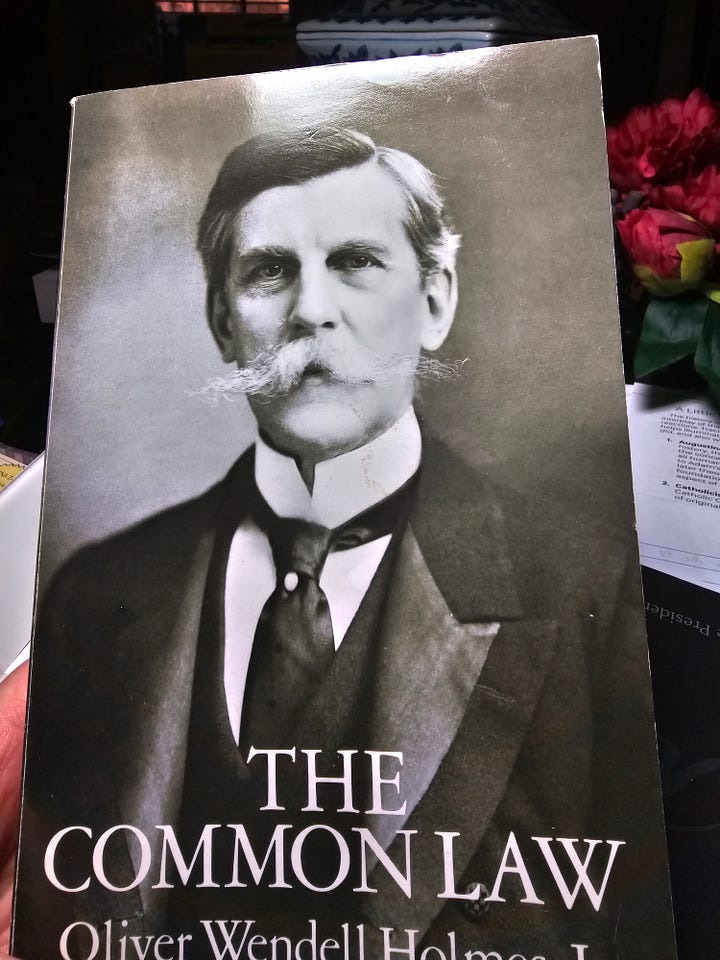
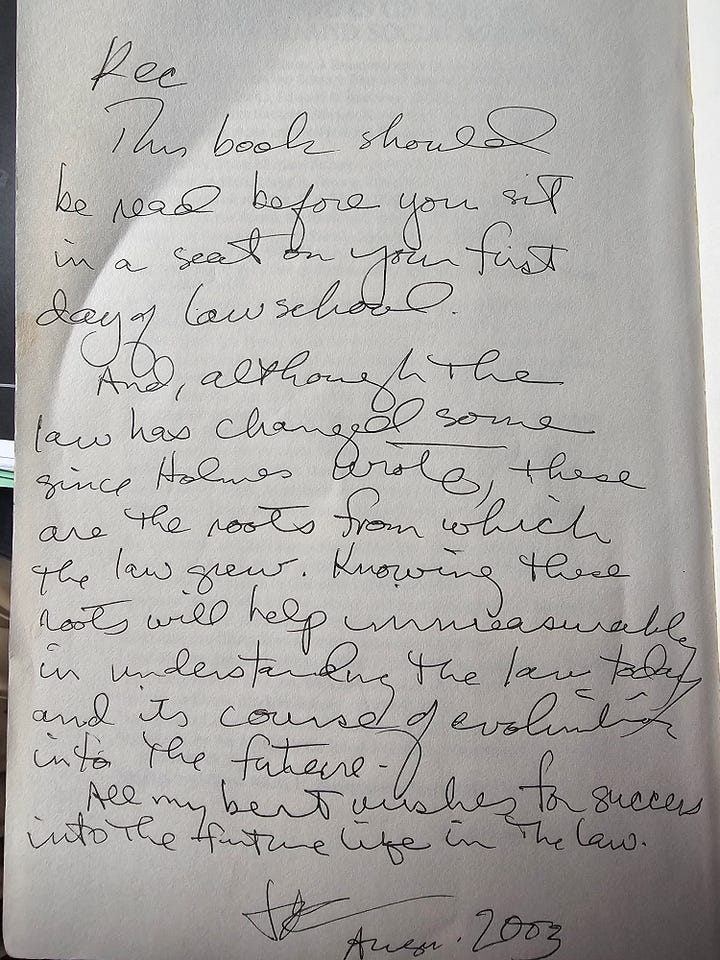
Legal Realism
In place of legal formalism, Holmes offered a new concept, legal realism. Legal realism is predicated on the idea that all the law derives from then-current social interests and the accepted public policy of a given time and place. Law is not a series of rules; instead, it is what judges say the law is (or in their opinion should be), irrespective of tradition, dogma, or any supernatural authority over human behavior. much less an objective reality.
According to Black’s Law Dictionary, legal realism is:
[a] perspective that legal rules are to benefit the larger society and public policy based on judicial decisions. Neither dogma or supernatural authority applies. A court is expected to determine ‘legal rights’ and ‘legal duties’. In the extreme, a judge considering rights [of] an accused, is in fact deciding what rights this judge is going to let the accused have. It is an absurdity, where the law is not applied.
In sum, legal realism gives judges unfettered control over the interpretation of legal texts and how they should or shouldn’t apply to a particular set of facts. Here’s Holmes in his own words.
The life of the law has not been logic: it has been experience. The felt necessities of the time, the prevalent moral and political theories, intuitions of public policy, avowed or unconscious, even the prejudices which judges share with their fellow-men, have had a good deal more to do than the syllogism in determining the rules by which men should be governed.
“Three Generations of Imbeciles Are Enough”
Holmes agreed with Charles Darwin that his concept of natural selection, or the survival of the fittest described in Darwin’s On the Origin of Species by Means of Natural Selection, or the Preservation of Favoured Races in the Struggle for Life, should be applied to humans, not just lower animals. Although humans don’t “naturally select” the fittest when it comes to their choice of mate, Holmes, as did many of his contemporaries, believed that it was in the public’s best interest to see that the weakest among us discontinue reproducing while the fittest would be encouraged to engage in a form of “selective breeding.” This is, of course, the controlling premise of the eugenics movement that took America by storm in the 1920s. To illustrate Holmes’ full embrace of legal realism and simultaneous disregard for legal formalism, we can look at one of his most famous Supreme Court opinions: Buck v. Bell.
Buck v. Bell involved the legitimacy of Virginia’s Eugenical Sterilization Act of 1924, a statute authorizing the state to sterilize (primarily) women for being genetic threats to society. These “threats” were supported by the “obvious” existence of “faulty” genes, which produced over-sexed tendencies and a general propensity for promiscuous behavior in women. The allegations of “faulty” genes naturally relied on long-discredited and ridiculous claims of “faulty” hereditary science.
Carrie Buck was just 17 when her adoptive family sent her to the Virginia State Colony for Epileptics and Feebleminded on the grounds her “feeble-mindedness” arose from promiscuity, evidenced solely by the fact she’d become pregnant out of wedlock, rendering her a degenerate and a disgrace to society. In reality, the family was simply protecting their (not her) reputation from scandal and covered up the fact that Buck was raped by a family member, resulting in her out-of-wedlock pregnancy. The state saw a perfect opportunity to get eugenics into the courts - with the ultimate goal of reaching the Supreme Court - with Carrie Buck’s “situation.” The state conveniently recommended an attorney, Irving Whitehead, to file suit against the state on behalf of Carrie Buck to initiate the litigation. Regrettably, it was a setup from day one, which is usually the case for most of our controversial cases. Whitehead didn’t call any witnesses at the trial.
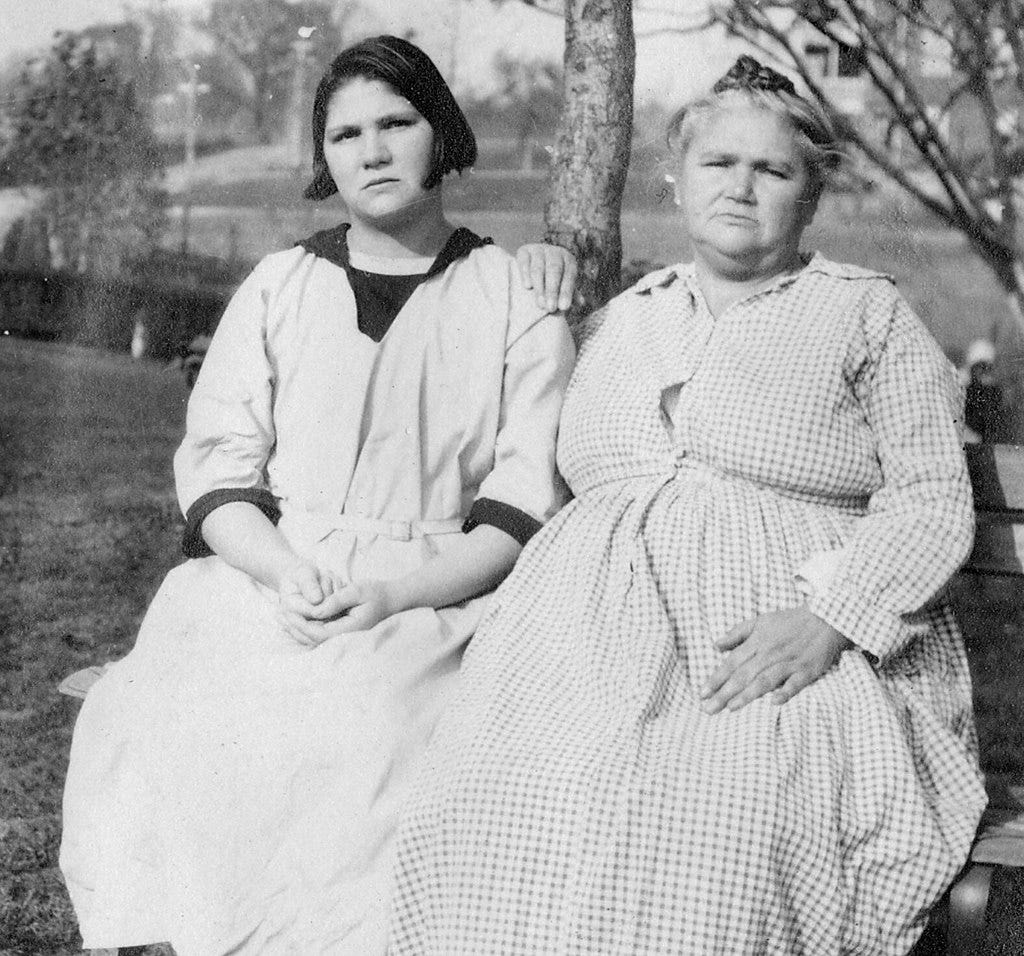
Of course, the case reached SCOTUS (Supreme Court of the United States) and Oliver Wendell Holmes, Jr. wrote the majority opinion. Here’s an excerpt.
We have seen more than once that the public welfare may call upon the best citizens for their lives. It would be strange if it could not call upon those who already sap the strength of the State for these lesser sacrifices, often not felt to be such by those concerned, to prevent our being swamped with incompetence. It is better for all the world if, instead of waiting to execute degenerate offspring for crime or to let them starve for their imbecility, society can prevent those who are manifestly unfit from continuing their kind. The principle that sustains compulsory vaccination is broad enough to cover cutting the Fallopian tubes … Three generations of imbeciles are enough.
The three generations were Carrie’s birth mother, Emma, Carrie, and Carrie’s daughter, Vivian.
Carrie’s birth mother had been abandoned by her husband early in their marriage, leaving her pregnant and destitute. Her reward was being committed to the Virginia State Colony for Epileptics and the Feebleminded where she gave birth to Carrie, who was later adopted.
Carrie lived to age 76, dying in 1983. Her daughter, Vivian, a bright and promising young girl, contracted measles when she was eight and died from a secondary infection shortly after. Despite marrying twice (her first husband passed away), Carrie was unable to have any more children on account of her forced sterilization, which was performed - without her consent - about five months after the Buck v. Bell decision came down.
Back to Alice and the Cat
You’ve been holding a thought for me … thank you …
If any advice is timeless, it’s knowing you’ll never get anywhere if you don’t know where you’re going. And you can’t chart a course if you don’t know where you are.
My last post, #21: Worldview Informs Every Area of Life, posits that authority sits at the center of every worldview, every ideology, and every belief system, whichever your preferred term. Here’s a snippet of the post for convenience:
Authority comes from one of two sources:
(1) nature, the natural world, or
(2) supernature, the supernatural world.
As such, authority either begins and ends inside the natural world (with man), or it begins and ends outside the natural world, with something other than man, higher than man. It begins and ends in the supernatural world (with God).
Regardless of its source, authority determines what is right and what is wrong (values), what is true and what is false (facts), who we are (humanity), what the world is (universe), and why we exist (destiny). Worldview authority is the main character in the meta-narrative it represents.

Controlling authority (nature or supernature) sits at the center of the inner circle - the bullseye.
The controlling authority informs values, including defining just what values are (the next circle). It also determines facts, specifically what counts as a fact and what does not, which, in turn, tells us what is true and what is false (also in the next circle).
Finally, authority tells us who we are, what the world is, why we exist, how it all ends, and how we can and should relate to each other in it (the outer circle). This is played out in how we understand history, politics, education, law, arts, culture, science, psychology, medicine, biology, economics, and so forth.
— pause for a recap —
To be clear, if a controlling authority tells us what is right and wrong, what is true and false, then impacts every single solitary area of life. Consider Oliver Wendell Holmes, Jr.’s social Darwinism and legal realism Exhibit A.
— unpause —
In the Christian worldview, the God of the Bible created the world and everything in it so He occupies the position of authority over values, facts, and how they should inform every other part of life. Christianity, then, does not provide anyone, whether a believer or not, with private authority to decide what is right or wrong, or what is true or false, since there is an objective reality that already contains those answers and is discoverable by everyone. Christianity is not a private personal faith, rather it’s a meta-narrative that explains all of reality from creation to eternity.
Few religions make this claim, which is why we often see Christianity referred to as an entire belief system that involves a personal relationship between the Creator and the created.
By contrast, in a naturalistic, or secular, worldview, also referred to as secular humanism, man was made from matter (or material) without supernatural intervention or design. He, then, is the supreme authority over himself and the world. Man, without access to anything outside of himself, determines what is true and what is not true solely by means of reason and science. Man does not discover truth, he invents it. He also defines his own values, rendering them subjective and personal. This makes them inapplicable to the wider world except through persuasion.
Secular humanism, while also a religion in that it, too, deals with ultimate things, is a competing meta-narrative to Christianity.
—
Worldview authority determines our destiny - it tells us why we exist and where we’re going. It provides each aspect of life with a telos (purpose) and provides us humans with the tools needed to stay on course in pursuit of our ends. Naturally, worldview authority tells us whether human law is subject to a higher law - the natural law, or is subject solely to the private positions of judges. The former recognizes a natural order in the world, which operates according to a fixed set of natural laws governing its design and function. The higher law is an objective reality that exists irrespective of personal acknowledgment. The latter rejects the presence of natural order in the world, believing that the earth - and everything in it - operates without a fixed design or purpose and remains in a perpetual state of evolution. There is no immovable reality; everything is relative and subjective, including the law. There’s much more to say on this topic, but I’ll leave it here for now.
Timeless Wisdom, Timeless Advice
Lewis Carroll was a wonderful and delightful writer; he was also a genius for providing us with timeless wisdom and advice:
1 - You’ll never get anywhere if you don’t know where you’re going.
2 - You can’t chart a course if you don’t know where you are.
Let’s filter this wisdom through the lens of two opposing worldviews - theism (in this essay, Christianity) and naturalism (here also, secular humanism).
Christianity
In Christianity, the Bible outlines God’s revealed plan for his entire creation from before the foundation of the world through the end of the age. Professing Christians who believe Scripture is inspired by God (divine authorship) and inerrant and understand how to read it correctly always know where they and the world are headed. And because of God’s specific revelation (Bible) and general revelation (creation), believers are always clear on their current location. They can faithfully rely on revelation to show them the path to their ultimate destination. Christianity isn’t just a private faith; it’s the story of reality, and nothing remains unaddressed in the worldview it creates. This helps to account for its endurance.
When many say that America is a Christian nation, they don’t mean that Christianity is the established religion of the United States (that’s propaganda from the bizarre Christian Nationalist movement, which exists primarily in the heads of secularists). They mean that the nation and its laws were founded on the Judeo-Christian understanding of the world and the role humans play in it.
SIDEBAR » Their conclusion is accurate, evidenced not just by the founders’ writings but also by the American Law Institute’s methodical strategy to remove any hint of Biblical ethics from the law in the early to mid-20th century.
Theism, with a strong emphasis on biblical Christianity (not Judaism and not Islam, the other monotheistic worldviews), is the worldview in which this country was conceived and understood as a sovereign nation governed exclusively by the consent of the governed. Without the external “law above the law,” that is the natural order to impose boundaries on human behavior and define what is acceptable and unacceptable for a flourishing society, America doesn’t make sense, and America doesn’t work. To be clear, both the form and purpose of our legal system, as envisioned by the founding generation, are grounded in the pedagogical nature and purpose of the Mosaic law. This was a massive personal problem for Oliver Wendell Holmes, Jr., so, as we’ve demonstrated, set out to change things up and get us onto a different path.
Secular Humanism
In secular humanism, there is no predetermined plan for the world - no telos (purpose) and humans are just another species of animal in the evolutionary continuum. There were pre-humans, now there are humans, and one day, humanity as we know it will give way to a post-human species characterized by a merging of biology and technology. Proponents of this worldview promise the end result is immortality if all goes well, at least Ray Kurzweil does in his 2005 book The Singularity is Near and I assume he will continue to do in his forthcoming The Singularity is Nearer. Also in this worldview is the necessity for sovereign nations to disappear and be mere relics of prior historical epochs. Dissolving national boundaries is essential to make way for the emergence of the new and improved global man, a citizen of the world.
Unsurprisingly, there are no gods, there are no masters, there are no rules. There is no predetermined end to the world per se, just an amorphous idea that a stateless utopia will eventually arise through various dialectical processes that curiously have never worked, but we are assured will most certainly work now. But there is power and plenty of it. For example, law for secular humanists is not a tool to protect a natural order that encompasses human rights and human dignity but is a tool to wield power to move toward an ill-defined and presently unknowable end. Man alone is the arbiter of justice and is subject to nothing and no one outside of himself.
The secular humanist, or naturalist, worldview produces Supreme Court justices like Oliver Wendell Holmes., Jr., who, in 1921, six years before Buck v. Bell, told future justice Felix Frankfurter that he had no problem “restricting propagation by the undesirables and putting to death infants that didn’t pass the examination.” Hey - what’s good for the goose is good for the gander, right?
Some “Ending” Thoughts
I started studying the implosion of American culture in earnest in 2022 and have struggled particularly with the intellectual dissonance necessary for social justice warriors’s efforts to ground human rights, human dignity, and the rule of law in secular humanism when it simply provides no basis for doing so. Value is mere perception irrespective of its object. It is the Judeo-Christian worldview that provides a basis for human value and dignity (man is a special creation with a unique nature, not just an evolved animal). Yet, this worldview is the primary focus of the secularist’s unmitigated disgust and cancellation strategies.
Think of it this way. There’s usually a rational, albeit unhelpful, explanation for why someone cheats on their spouse, but things move to an entirely new level of bizarre when one cheats on themselves. They commit intellectual adultery by denying rationality, logic, and truth they know exists, even if only subconsciously.
I’m a recovering intellectual adulterer and have been in corrective therapy for a few years, moving ever so methodically through the natural stages of grief, and finally seeing full acceptance on the horizon. I lost my mind, but I finally found it. In my post-cray-cray state, I’m just a rational American who always grounds her beliefs in … reality. I now know exactly why I exist, and where I’m going, and am always charting my course to get there.
Do you?
My friends, let’s always begin with the end in mind so we can chart a course to a specific somewhere, not nowhere - and, alas, get rid of the nonsense.
xo,
Kelley
P.S. Been spending a lot of time with my mom. I'm grateful she’s still with us and doing well, all things considered. The cancer is everywhere and is slowly filling her lungs, but she’s experiencing very little pain. It’s only a matter of time before she slips away, but it is time I am treasuring. Traveling back to Florida to visit soon.






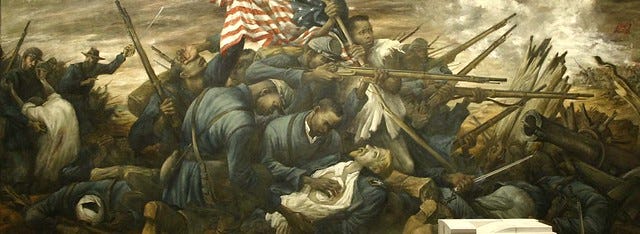
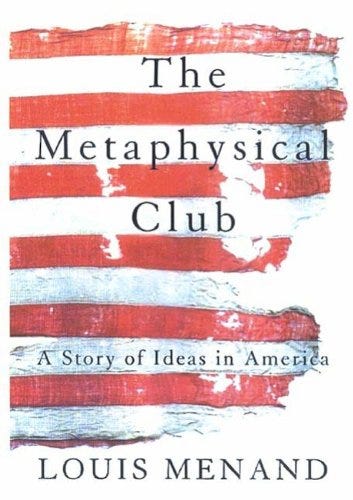
Fantastic!
Great post... and an excellent summary of where we are today. Praying for you and your mom...